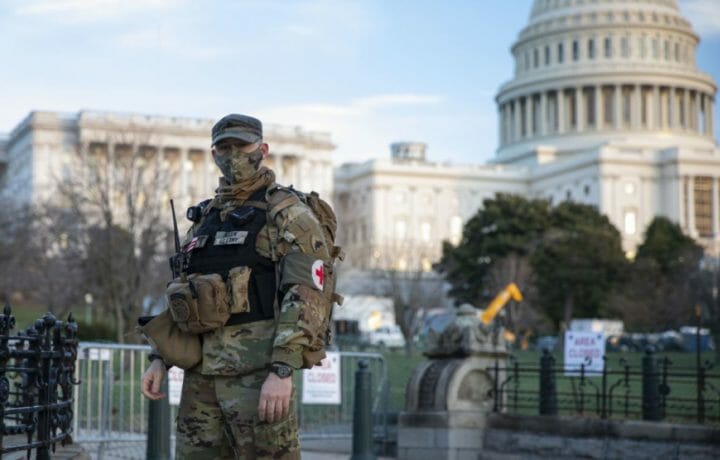Last week, a judge acquitted a defense contractor who was arrested in April 2021 for entering and remaining in a restricted building; disorderly and disruptive conduct in a restricted building; violent entry and disorderly conduct in a Capitol building; and parading, demonstrating or picketing in a Capitol building. The individual is the first individual acquitted at trial. He noted that he hoped his acquittal would allow him to get back to his job as an engineer at Los Alamos, NM.
The case is one of several Capitol riot cases going to trial. The defendant in this case, Matthew Martin, testified in his defense in a two-day trial that culminated in a bench ruling in the case. Critical to the decision was cell phone footage provided by Martin which appeared to show a Capitol policeman standing at the door and gesturing toward someone in attendance. Martin claims he saw that as being ‘let in’ by Capitol police officers.
Will Martin get his clearance back?
Martin has dodged criminal charges, but what’s unclear is if he’ll find any path back into a national security career. Martin noted he had been fired from his job after charges were filed; it’s not clear what happened to his security clearance, but it’s possibly entered a ‘loss of jurisdiction’ status pending the criminal case and in light of his employment termination. Employment law, criminal law, and security clearance procedures are all three very different things.
“There are different burdens of proof required in criminal and security clearance cases.,” said security clearance attorney and regular ClearanceJobs contributor Sean Bigley, who also notes he does not represent the individual involved in the case. “The former requires proof beyond a reasonable doubt for conviction, whereas the latter requires only substantial evidence for an unfavorable decision. Substantial evidence is a very low standard – even less than a preponderance of the evidence, which is the standard in most civil cases. In other words, it is possible that someone could be found not guilty in a criminal court and still have their security clearance denied or revoked on the same set of facts.”
With criminal conduct charges dropped, however, it’s speculative as to what grounds the government would use in a security clearance denial. Guideline A, allegiance to the United States, may seem like a possibility, but Bigley noted Guideline A denials are very rare.
One piece of pending legislation seeks to specifically address clearance holders and applicants involved in January 6 events. The Security Clearance Improvement Act sponsored by Rep. Stephanie Murphy seeks to ask anyone applying for a security clearance if they participated in any ‘Stop the Steal’ rallies and the precise role they played in those events. Barring any new legislation, the clear adjudicative guidelines would be personal conduct, criminal conduct, or allegiance to the United States. In all, the government will have to prove that the individual did more than just protest – which is a constitutionally protected activity, even for a clearance holder.
“To proceed with credible Guideline A cases, the government is going to have to do more than merely show that the individual was present at a protest or that they entered the restricted area around the Capitol that may have been inadequately marked,” said Bigley. “Of course, the government could instead opt to proceed under Guidelines E and/or J, but I still think they’re going to have to prove more than merely entering a restricted area for these cases to withstand objective scrutiny.”
Regardless of clearance status, however, the employment issue may be the greater one. Martin notes he was fired after being charged with entering the Capitol building. He would have to find another employer willing to offer him a job before he would be able to regain his security clearance.
“But all of this assumes that clearance-holders facing these issues – and anecdotal evidence suggests there are dozens more – can find or retain sponsorship of their security clearance,” said Bigley. “That may be the toughest battle, given the optics issues and uncertainty surrounding adjudicative outcomes.”




